Comprehensive Analysis: Nursing Ethics, Law, and End-of-Life Issues
VerifiedAdded on 2020/10/22
|25
|8012
|404
Report
AI Summary
This report provides a detailed overview of legal and ethical considerations in the Australian nursing context. It begins by exploring the purpose of nursing codes of ethics and the role of the Nursing and Midwifery Board of Australia (NMBA) in regulating the profession, including practice guidelines, standards, and fact sheets. The report then delves into key ethical and legal issues, such as discrimination, duty of care, equal employment opportunity, human rights, and informed consent. It examines issues related to life and death, including power of attorney, living wills, and advance directives, as well as mandatory reporting requirements. Privacy and confidentiality, social media policies, and relevant Commonwealth and State/Territory legislation are also discussed. The report covers topics such as continuous professional education, and provides a comprehensive analysis of the legal and ethical responsibilities of nurses in Australia. References are included to support the information provided.
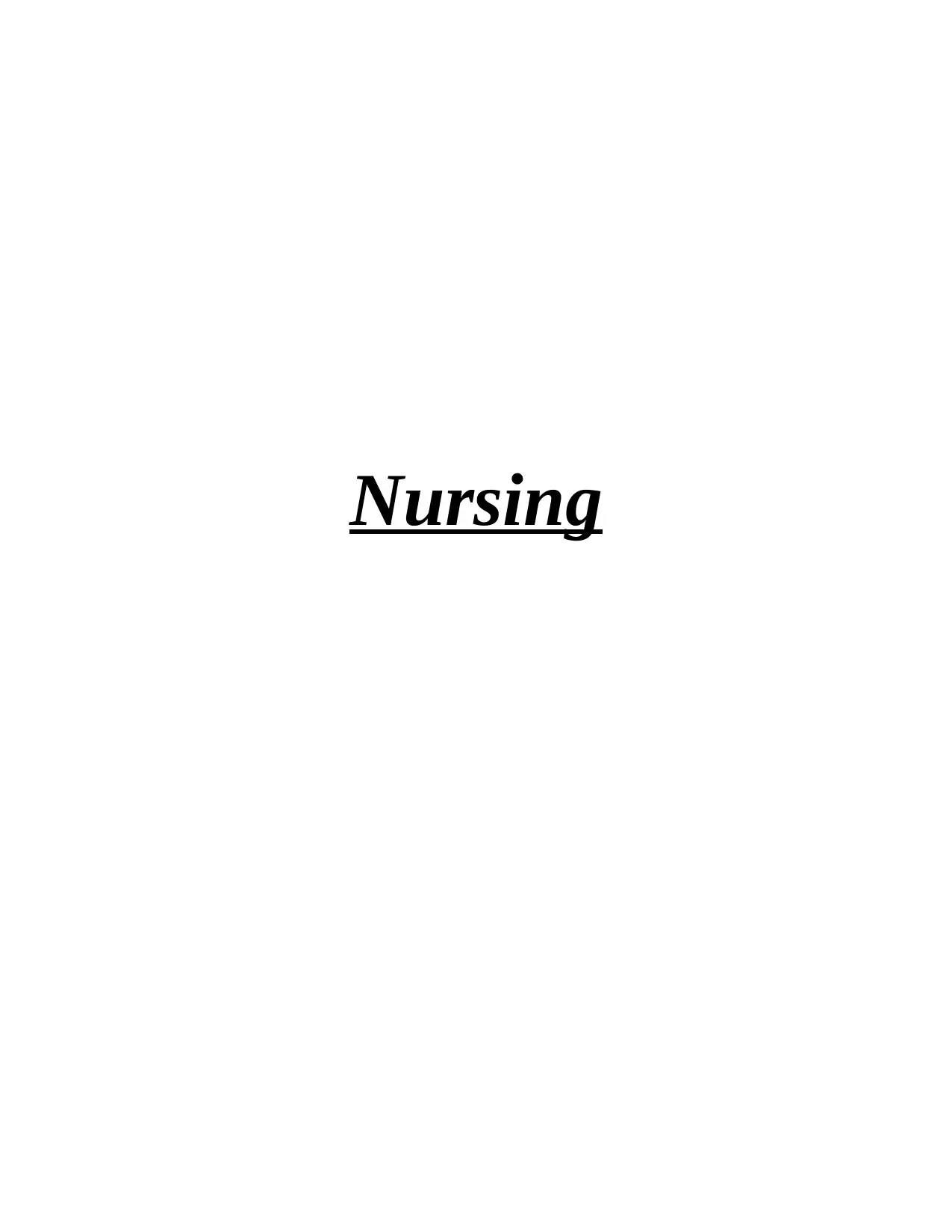
Nursing
Paraphrase This Document
Need a fresh take? Get an instant paraphrase of this document with our AI Paraphraser
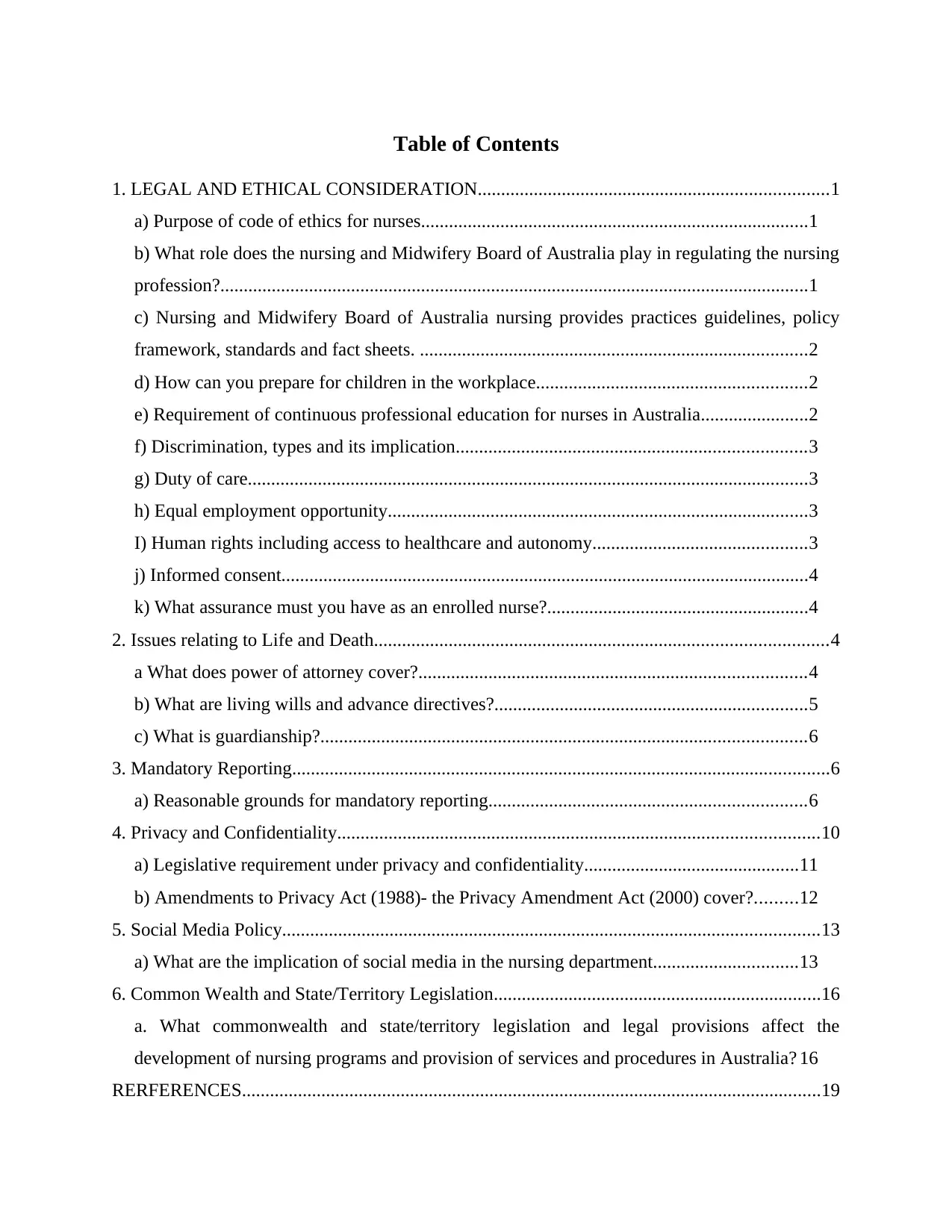
Table of Contents
1. LEGAL AND ETHICAL CONSIDERATION...........................................................................1
a) Purpose of code of ethics for nurses...................................................................................1
b) What role does the nursing and Midwifery Board of Australia play in regulating the nursing
profession?..............................................................................................................................1
c) Nursing and Midwifery Board of Australia nursing provides practices guidelines, policy
framework, standards and fact sheets. ...................................................................................2
d) How can you prepare for children in the workplace..........................................................2
e) Requirement of continuous professional education for nurses in Australia.......................2
f) Discrimination, types and its implication...........................................................................3
g) Duty of care........................................................................................................................3
h) Equal employment opportunity..........................................................................................3
I) Human rights including access to healthcare and autonomy..............................................3
j) Informed consent.................................................................................................................4
k) What assurance must you have as an enrolled nurse?........................................................4
2. Issues relating to Life and Death.................................................................................................4
a What does power of attorney cover?...................................................................................4
b) What are living wills and advance directives?...................................................................5
c) What is guardianship?........................................................................................................6
3. Mandatory Reporting...................................................................................................................6
a) Reasonable grounds for mandatory reporting....................................................................6
4. Privacy and Confidentiality.......................................................................................................10
a) Legislative requirement under privacy and confidentiality..............................................11
b) Amendments to Privacy Act (1988)- the Privacy Amendment Act (2000) cover?.........12
5. Social Media Policy...................................................................................................................13
a) What are the implication of social media in the nursing department...............................13
6. Common Wealth and State/Territory Legislation......................................................................16
a. What commonwealth and state/territory legislation and legal provisions affect the
development of nursing programs and provision of services and procedures in Australia? 16
RERFERENCES............................................................................................................................19
1. LEGAL AND ETHICAL CONSIDERATION...........................................................................1
a) Purpose of code of ethics for nurses...................................................................................1
b) What role does the nursing and Midwifery Board of Australia play in regulating the nursing
profession?..............................................................................................................................1
c) Nursing and Midwifery Board of Australia nursing provides practices guidelines, policy
framework, standards and fact sheets. ...................................................................................2
d) How can you prepare for children in the workplace..........................................................2
e) Requirement of continuous professional education for nurses in Australia.......................2
f) Discrimination, types and its implication...........................................................................3
g) Duty of care........................................................................................................................3
h) Equal employment opportunity..........................................................................................3
I) Human rights including access to healthcare and autonomy..............................................3
j) Informed consent.................................................................................................................4
k) What assurance must you have as an enrolled nurse?........................................................4
2. Issues relating to Life and Death.................................................................................................4
a What does power of attorney cover?...................................................................................4
b) What are living wills and advance directives?...................................................................5
c) What is guardianship?........................................................................................................6
3. Mandatory Reporting...................................................................................................................6
a) Reasonable grounds for mandatory reporting....................................................................6
4. Privacy and Confidentiality.......................................................................................................10
a) Legislative requirement under privacy and confidentiality..............................................11
b) Amendments to Privacy Act (1988)- the Privacy Amendment Act (2000) cover?.........12
5. Social Media Policy...................................................................................................................13
a) What are the implication of social media in the nursing department...............................13
6. Common Wealth and State/Territory Legislation......................................................................16
a. What commonwealth and state/territory legislation and legal provisions affect the
development of nursing programs and provision of services and procedures in Australia? 16
RERFERENCES............................................................................................................................19

⊘ This is a preview!⊘
Do you want full access?
Subscribe today to unlock all pages.

Trusted by 1+ million students worldwide
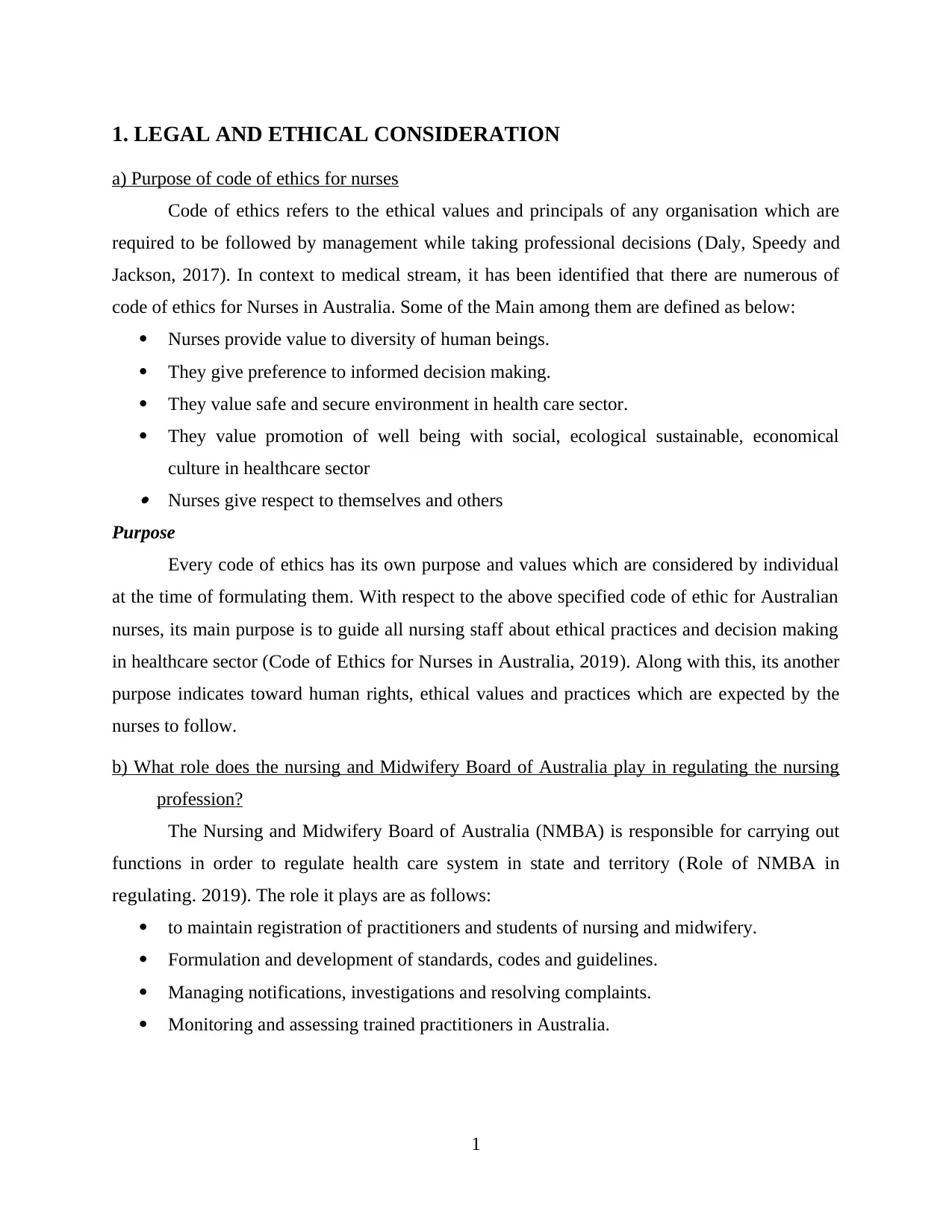
1. LEGAL AND ETHICAL CONSIDERATION
a) Purpose of code of ethics for nurses
Code of ethics refers to the ethical values and principals of any organisation which are
required to be followed by management while taking professional decisions (Daly, Speedy and
Jackson, 2017). In context to medical stream, it has been identified that there are numerous of
code of ethics for Nurses in Australia. Some of the Main among them are defined as below:
Nurses provide value to diversity of human beings.
They give preference to informed decision making.
They value safe and secure environment in health care sector.
They value promotion of well being with social, ecological sustainable, economical
culture in healthcare sector Nurses give respect to themselves and others
Purpose
Every code of ethics has its own purpose and values which are considered by individual
at the time of formulating them. With respect to the above specified code of ethic for Australian
nurses, its main purpose is to guide all nursing staff about ethical practices and decision making
in healthcare sector ( Code of Ethics for Nurses in Australia, 2019). Along with this, its another
purpose indicates toward human rights, ethical values and practices which are expected by the
nurses to follow.
b) What role does the nursing and Midwifery Board of Australia play in regulating the nursing
profession?
The Nursing and Midwifery Board of Australia (NMBA) is responsible for carrying out
functions in order to regulate health care system in state and territory ( Role of NMBA in
regulating. 2019). The role it plays are as follows:
to maintain registration of practitioners and students of nursing and midwifery.
Formulation and development of standards, codes and guidelines.
Managing notifications, investigations and resolving complaints.
Monitoring and assessing trained practitioners in Australia.
1
a) Purpose of code of ethics for nurses
Code of ethics refers to the ethical values and principals of any organisation which are
required to be followed by management while taking professional decisions (Daly, Speedy and
Jackson, 2017). In context to medical stream, it has been identified that there are numerous of
code of ethics for Nurses in Australia. Some of the Main among them are defined as below:
Nurses provide value to diversity of human beings.
They give preference to informed decision making.
They value safe and secure environment in health care sector.
They value promotion of well being with social, ecological sustainable, economical
culture in healthcare sector Nurses give respect to themselves and others
Purpose
Every code of ethics has its own purpose and values which are considered by individual
at the time of formulating them. With respect to the above specified code of ethic for Australian
nurses, its main purpose is to guide all nursing staff about ethical practices and decision making
in healthcare sector ( Code of Ethics for Nurses in Australia, 2019). Along with this, its another
purpose indicates toward human rights, ethical values and practices which are expected by the
nurses to follow.
b) What role does the nursing and Midwifery Board of Australia play in regulating the nursing
profession?
The Nursing and Midwifery Board of Australia (NMBA) is responsible for carrying out
functions in order to regulate health care system in state and territory ( Role of NMBA in
regulating. 2019). The role it plays are as follows:
to maintain registration of practitioners and students of nursing and midwifery.
Formulation and development of standards, codes and guidelines.
Managing notifications, investigations and resolving complaints.
Monitoring and assessing trained practitioners in Australia.
1
Paraphrase This Document
Need a fresh take? Get an instant paraphrase of this document with our AI Paraphraser
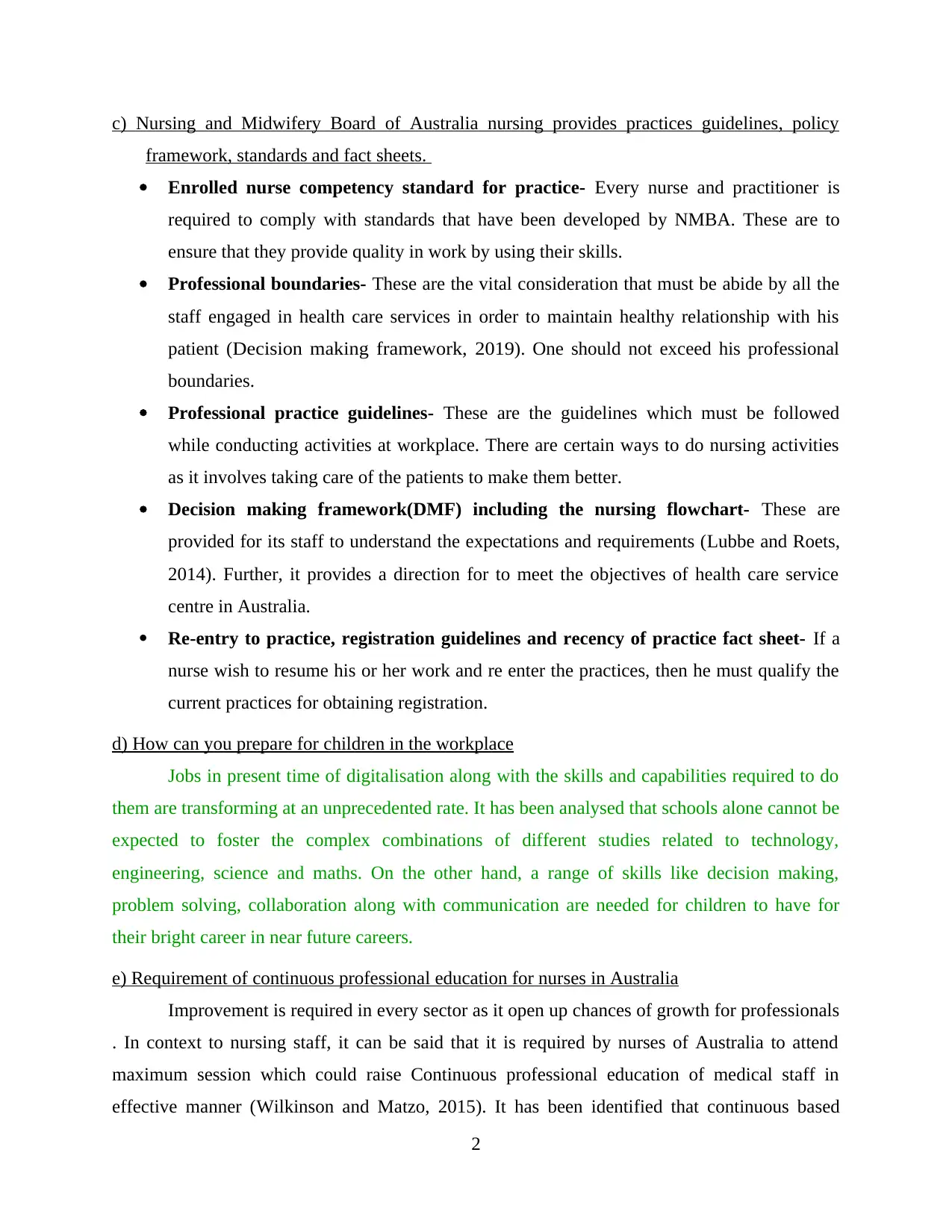
c) Nursing and Midwifery Board of Australia nursing provides practices guidelines, policy
framework, standards and fact sheets.
Enrolled nurse competency standard for practice- Every nurse and practitioner is
required to comply with standards that have been developed by NMBA. These are to
ensure that they provide quality in work by using their skills.
Professional boundaries- These are the vital consideration that must be abide by all the
staff engaged in health care services in order to maintain healthy relationship with his
patient ( Decision making framework, 2019). One should not exceed his professional
boundaries.
Professional practice guidelines- These are the guidelines which must be followed
while conducting activities at workplace. There are certain ways to do nursing activities
as it involves taking care of the patients to make them better.
Decision making framework(DMF) including the nursing flowchart- These are
provided for its staff to understand the expectations and requirements (Lubbe and Roets,
2014). Further, it provides a direction for to meet the objectives of health care service
centre in Australia.
Re-entry to practice, registration guidelines and recency of practice fact sheet- If a
nurse wish to resume his or her work and re enter the practices, then he must qualify the
current practices for obtaining registration.
d) How can you prepare for children in the workplace
Jobs in present time of digitalisation along with the skills and capabilities required to do
them are transforming at an unprecedented rate. It has been analysed that schools alone cannot be
expected to foster the complex combinations of different studies related to technology,
engineering, science and maths. On the other hand, a range of skills like decision making,
problem solving, collaboration along with communication are needed for children to have for
their bright career in near future careers.
e) Requirement of continuous professional education for nurses in Australia
Improvement is required in every sector as it open up chances of growth for professionals
. In context to nursing staff, it can be said that it is required by nurses of Australia to attend
maximum session which could raise Continuous professional education of medical staff in
effective manner (Wilkinson and Matzo, 2015). It has been identified that continuous based
2
framework, standards and fact sheets.
Enrolled nurse competency standard for practice- Every nurse and practitioner is
required to comply with standards that have been developed by NMBA. These are to
ensure that they provide quality in work by using their skills.
Professional boundaries- These are the vital consideration that must be abide by all the
staff engaged in health care services in order to maintain healthy relationship with his
patient ( Decision making framework, 2019). One should not exceed his professional
boundaries.
Professional practice guidelines- These are the guidelines which must be followed
while conducting activities at workplace. There are certain ways to do nursing activities
as it involves taking care of the patients to make them better.
Decision making framework(DMF) including the nursing flowchart- These are
provided for its staff to understand the expectations and requirements (Lubbe and Roets,
2014). Further, it provides a direction for to meet the objectives of health care service
centre in Australia.
Re-entry to practice, registration guidelines and recency of practice fact sheet- If a
nurse wish to resume his or her work and re enter the practices, then he must qualify the
current practices for obtaining registration.
d) How can you prepare for children in the workplace
Jobs in present time of digitalisation along with the skills and capabilities required to do
them are transforming at an unprecedented rate. It has been analysed that schools alone cannot be
expected to foster the complex combinations of different studies related to technology,
engineering, science and maths. On the other hand, a range of skills like decision making,
problem solving, collaboration along with communication are needed for children to have for
their bright career in near future careers.
e) Requirement of continuous professional education for nurses in Australia
Improvement is required in every sector as it open up chances of growth for professionals
. In context to nursing staff, it can be said that it is required by nurses of Australia to attend
maximum session which could raise Continuous professional education of medical staff in
effective manner (Wilkinson and Matzo, 2015). It has been identified that continuous based
2
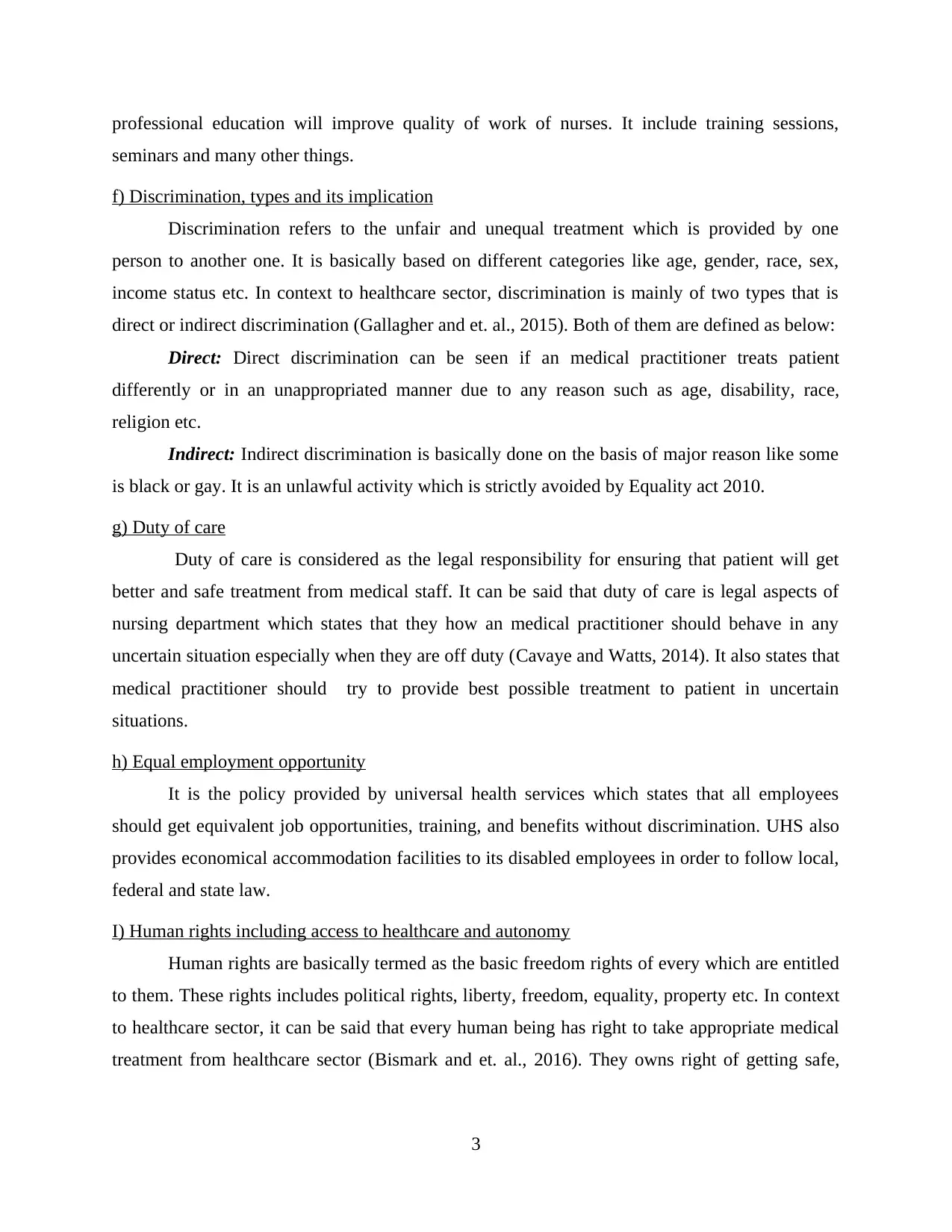
professional education will improve quality of work of nurses. It include training sessions,
seminars and many other things.
f) Discrimination, types and its implication
Discrimination refers to the unfair and unequal treatment which is provided by one
person to another one. It is basically based on different categories like age, gender, race, sex,
income status etc. In context to healthcare sector, discrimination is mainly of two types that is
direct or indirect discrimination (Gallagher and et. al., 2015). Both of them are defined as below:
Direct: Direct discrimination can be seen if an medical practitioner treats patient
differently or in an unappropriated manner due to any reason such as age, disability, race,
religion etc.
Indirect: Indirect discrimination is basically done on the basis of major reason like some
is black or gay. It is an unlawful activity which is strictly avoided by Equality act 2010.
g) Duty of care
Duty of care is considered as the legal responsibility for ensuring that patient will get
better and safe treatment from medical staff. It can be said that duty of care is legal aspects of
nursing department which states that they how an medical practitioner should behave in any
uncertain situation especially when they are off duty (Cavaye and Watts, 2014). It also states that
medical practitioner should try to provide best possible treatment to patient in uncertain
situations.
h) Equal employment opportunity
It is the policy provided by universal health services which states that all employees
should get equivalent job opportunities, training, and benefits without discrimination. UHS also
provides economical accommodation facilities to its disabled employees in order to follow local,
federal and state law.
I) Human rights including access to healthcare and autonomy
Human rights are basically termed as the basic freedom rights of every which are entitled
to them. These rights includes political rights, liberty, freedom, equality, property etc. In context
to healthcare sector, it can be said that every human being has right to take appropriate medical
treatment from healthcare sector (Bismark and et. al., 2016). They owns right of getting safe,
3
seminars and many other things.
f) Discrimination, types and its implication
Discrimination refers to the unfair and unequal treatment which is provided by one
person to another one. It is basically based on different categories like age, gender, race, sex,
income status etc. In context to healthcare sector, discrimination is mainly of two types that is
direct or indirect discrimination (Gallagher and et. al., 2015). Both of them are defined as below:
Direct: Direct discrimination can be seen if an medical practitioner treats patient
differently or in an unappropriated manner due to any reason such as age, disability, race,
religion etc.
Indirect: Indirect discrimination is basically done on the basis of major reason like some
is black or gay. It is an unlawful activity which is strictly avoided by Equality act 2010.
g) Duty of care
Duty of care is considered as the legal responsibility for ensuring that patient will get
better and safe treatment from medical staff. It can be said that duty of care is legal aspects of
nursing department which states that they how an medical practitioner should behave in any
uncertain situation especially when they are off duty (Cavaye and Watts, 2014). It also states that
medical practitioner should try to provide best possible treatment to patient in uncertain
situations.
h) Equal employment opportunity
It is the policy provided by universal health services which states that all employees
should get equivalent job opportunities, training, and benefits without discrimination. UHS also
provides economical accommodation facilities to its disabled employees in order to follow local,
federal and state law.
I) Human rights including access to healthcare and autonomy
Human rights are basically termed as the basic freedom rights of every which are entitled
to them. These rights includes political rights, liberty, freedom, equality, property etc. In context
to healthcare sector, it can be said that every human being has right to take appropriate medical
treatment from healthcare sector (Bismark and et. al., 2016). They owns right of getting safe,
3
⊘ This is a preview!⊘
Do you want full access?
Subscribe today to unlock all pages.

Trusted by 1+ million students worldwide
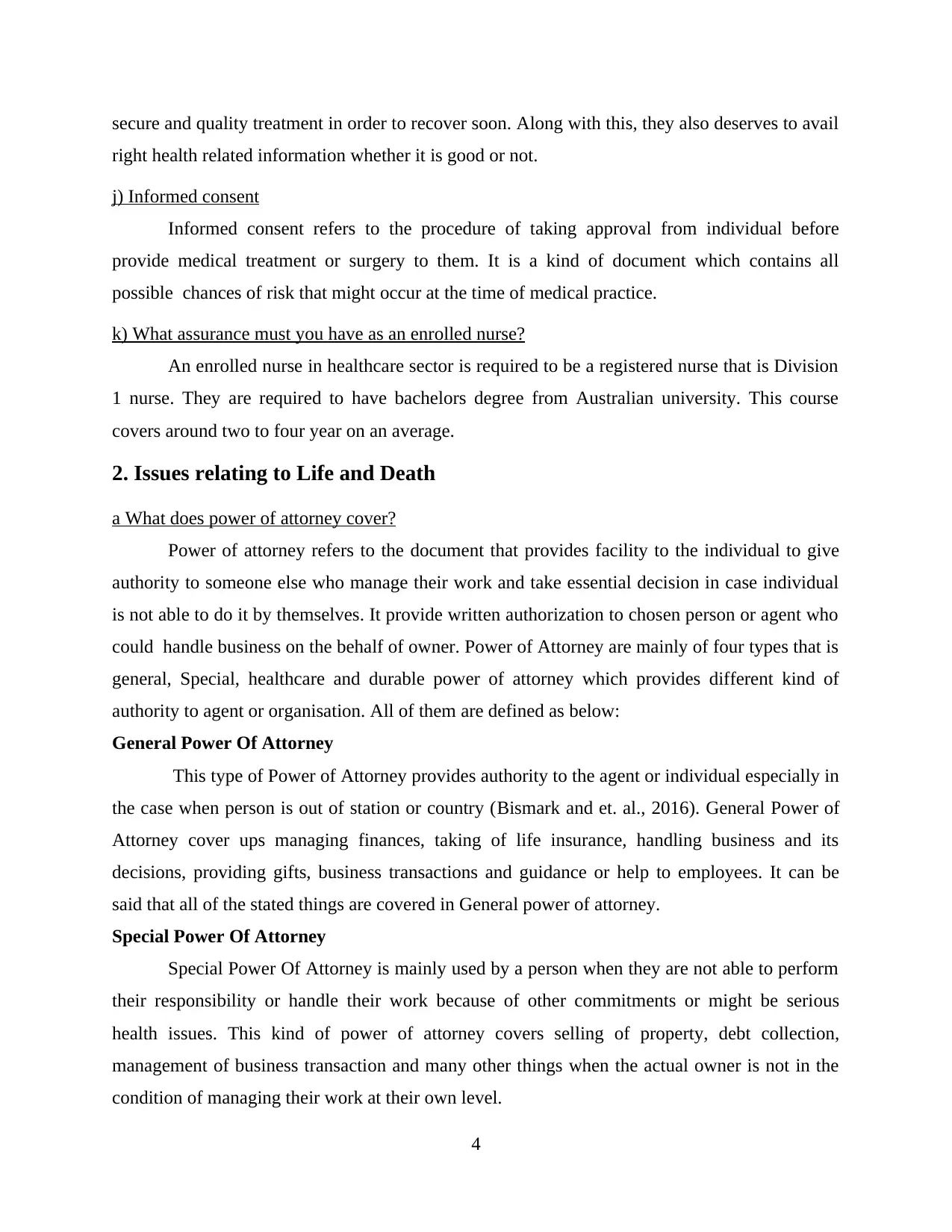
secure and quality treatment in order to recover soon. Along with this, they also deserves to avail
right health related information whether it is good or not.
j) Informed consent
Informed consent refers to the procedure of taking approval from individual before
provide medical treatment or surgery to them. It is a kind of document which contains all
possible chances of risk that might occur at the time of medical practice.
k) What assurance must you have as an enrolled nurse?
An enrolled nurse in healthcare sector is required to be a registered nurse that is Division
1 nurse. They are required to have bachelors degree from Australian university. This course
covers around two to four year on an average.
2. Issues relating to Life and Death
a What does power of attorney cover?
Power of attorney refers to the document that provides facility to the individual to give
authority to someone else who manage their work and take essential decision in case individual
is not able to do it by themselves. It provide written authorization to chosen person or agent who
could handle business on the behalf of owner. Power of Attorney are mainly of four types that is
general, Special, healthcare and durable power of attorney which provides different kind of
authority to agent or organisation. All of them are defined as below:
General Power Of Attorney
This type of Power of Attorney provides authority to the agent or individual especially in
the case when person is out of station or country (Bismark and et. al., 2016). General Power of
Attorney cover ups managing finances, taking of life insurance, handling business and its
decisions, providing gifts, business transactions and guidance or help to employees. It can be
said that all of the stated things are covered in General power of attorney.
Special Power Of Attorney
Special Power Of Attorney is mainly used by a person when they are not able to perform
their responsibility or handle their work because of other commitments or might be serious
health issues. This kind of power of attorney covers selling of property, debt collection,
management of business transaction and many other things when the actual owner is not in the
condition of managing their work at their own level.
4
right health related information whether it is good or not.
j) Informed consent
Informed consent refers to the procedure of taking approval from individual before
provide medical treatment or surgery to them. It is a kind of document which contains all
possible chances of risk that might occur at the time of medical practice.
k) What assurance must you have as an enrolled nurse?
An enrolled nurse in healthcare sector is required to be a registered nurse that is Division
1 nurse. They are required to have bachelors degree from Australian university. This course
covers around two to four year on an average.
2. Issues relating to Life and Death
a What does power of attorney cover?
Power of attorney refers to the document that provides facility to the individual to give
authority to someone else who manage their work and take essential decision in case individual
is not able to do it by themselves. It provide written authorization to chosen person or agent who
could handle business on the behalf of owner. Power of Attorney are mainly of four types that is
general, Special, healthcare and durable power of attorney which provides different kind of
authority to agent or organisation. All of them are defined as below:
General Power Of Attorney
This type of Power of Attorney provides authority to the agent or individual especially in
the case when person is out of station or country (Bismark and et. al., 2016). General Power of
Attorney cover ups managing finances, taking of life insurance, handling business and its
decisions, providing gifts, business transactions and guidance or help to employees. It can be
said that all of the stated things are covered in General power of attorney.
Special Power Of Attorney
Special Power Of Attorney is mainly used by a person when they are not able to perform
their responsibility or handle their work because of other commitments or might be serious
health issues. This kind of power of attorney covers selling of property, debt collection,
management of business transaction and many other things when the actual owner is not in the
condition of managing their work at their own level.
4
Paraphrase This Document
Need a fresh take? Get an instant paraphrase of this document with our AI Paraphraser
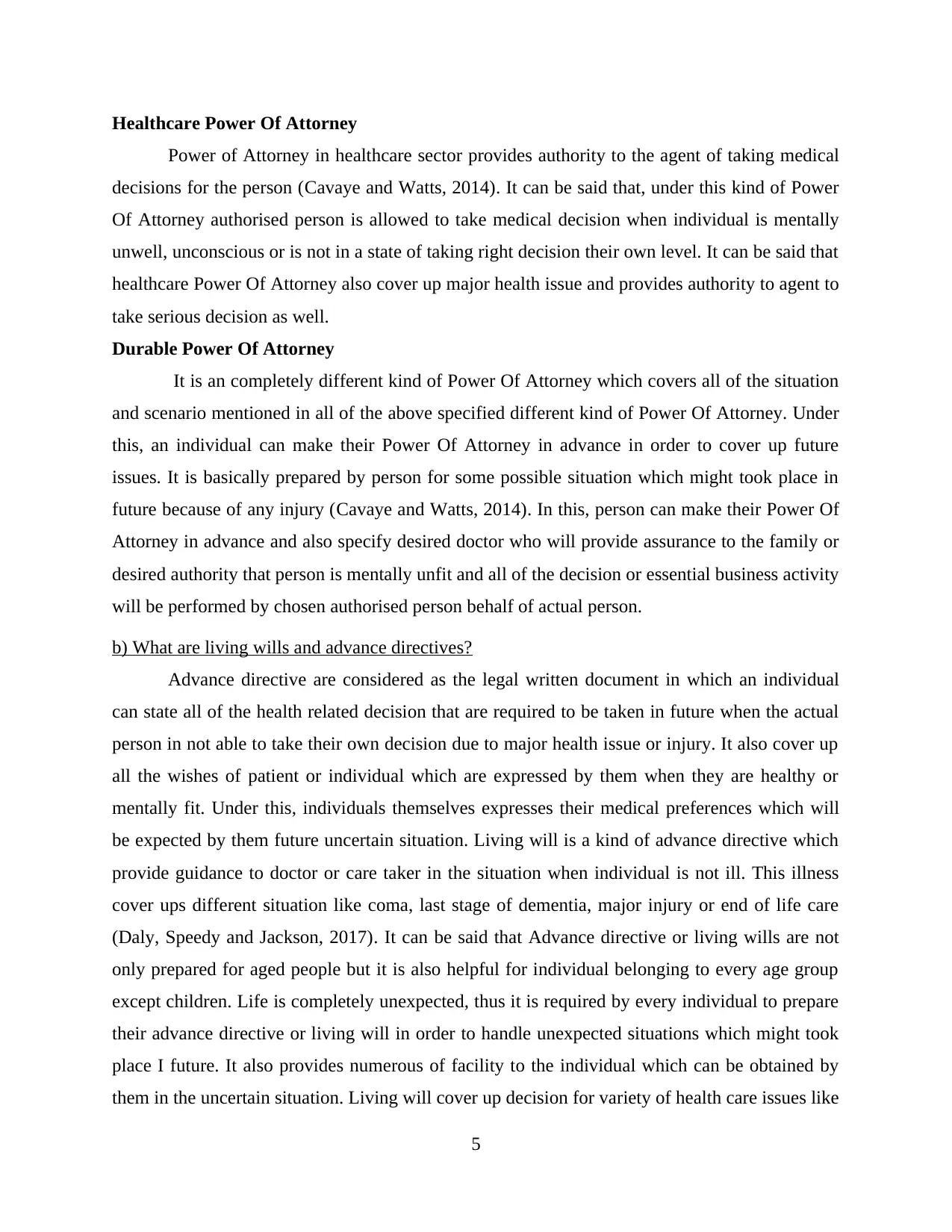
Healthcare Power Of Attorney
Power of Attorney in healthcare sector provides authority to the agent of taking medical
decisions for the person (Cavaye and Watts, 2014). It can be said that, under this kind of Power
Of Attorney authorised person is allowed to take medical decision when individual is mentally
unwell, unconscious or is not in a state of taking right decision their own level. It can be said that
healthcare Power Of Attorney also cover up major health issue and provides authority to agent to
take serious decision as well.
Durable Power Of Attorney
It is an completely different kind of Power Of Attorney which covers all of the situation
and scenario mentioned in all of the above specified different kind of Power Of Attorney. Under
this, an individual can make their Power Of Attorney in advance in order to cover up future
issues. It is basically prepared by person for some possible situation which might took place in
future because of any injury (Cavaye and Watts, 2014). In this, person can make their Power Of
Attorney in advance and also specify desired doctor who will provide assurance to the family or
desired authority that person is mentally unfit and all of the decision or essential business activity
will be performed by chosen authorised person behalf of actual person.
b) What are living wills and advance directives?
Advance directive are considered as the legal written document in which an individual
can state all of the health related decision that are required to be taken in future when the actual
person in not able to take their own decision due to major health issue or injury. It also cover up
all the wishes of patient or individual which are expressed by them when they are healthy or
mentally fit. Under this, individuals themselves expresses their medical preferences which will
be expected by them future uncertain situation. Living will is a kind of advance directive which
provide guidance to doctor or care taker in the situation when individual is not ill. This illness
cover ups different situation like coma, last stage of dementia, major injury or end of life care
(Daly, Speedy and Jackson, 2017). It can be said that Advance directive or living wills are not
only prepared for aged people but it is also helpful for individual belonging to every age group
except children. Life is completely unexpected, thus it is required by every individual to prepare
their advance directive or living will in order to handle unexpected situations which might took
place I future. It also provides numerous of facility to the individual which can be obtained by
them in the uncertain situation. Living will cover up decision for variety of health care issues like
5
Power of Attorney in healthcare sector provides authority to the agent of taking medical
decisions for the person (Cavaye and Watts, 2014). It can be said that, under this kind of Power
Of Attorney authorised person is allowed to take medical decision when individual is mentally
unwell, unconscious or is not in a state of taking right decision their own level. It can be said that
healthcare Power Of Attorney also cover up major health issue and provides authority to agent to
take serious decision as well.
Durable Power Of Attorney
It is an completely different kind of Power Of Attorney which covers all of the situation
and scenario mentioned in all of the above specified different kind of Power Of Attorney. Under
this, an individual can make their Power Of Attorney in advance in order to cover up future
issues. It is basically prepared by person for some possible situation which might took place in
future because of any injury (Cavaye and Watts, 2014). In this, person can make their Power Of
Attorney in advance and also specify desired doctor who will provide assurance to the family or
desired authority that person is mentally unfit and all of the decision or essential business activity
will be performed by chosen authorised person behalf of actual person.
b) What are living wills and advance directives?
Advance directive are considered as the legal written document in which an individual
can state all of the health related decision that are required to be taken in future when the actual
person in not able to take their own decision due to major health issue or injury. It also cover up
all the wishes of patient or individual which are expressed by them when they are healthy or
mentally fit. Under this, individuals themselves expresses their medical preferences which will
be expected by them future uncertain situation. Living will is a kind of advance directive which
provide guidance to doctor or care taker in the situation when individual is not ill. This illness
cover ups different situation like coma, last stage of dementia, major injury or end of life care
(Daly, Speedy and Jackson, 2017). It can be said that Advance directive or living wills are not
only prepared for aged people but it is also helpful for individual belonging to every age group
except children. Life is completely unexpected, thus it is required by every individual to prepare
their advance directive or living will in order to handle unexpected situations which might took
place I future. It also provides numerous of facility to the individual which can be obtained by
them in the uncertain situation. Living will cover up decision for variety of health care issues like
5
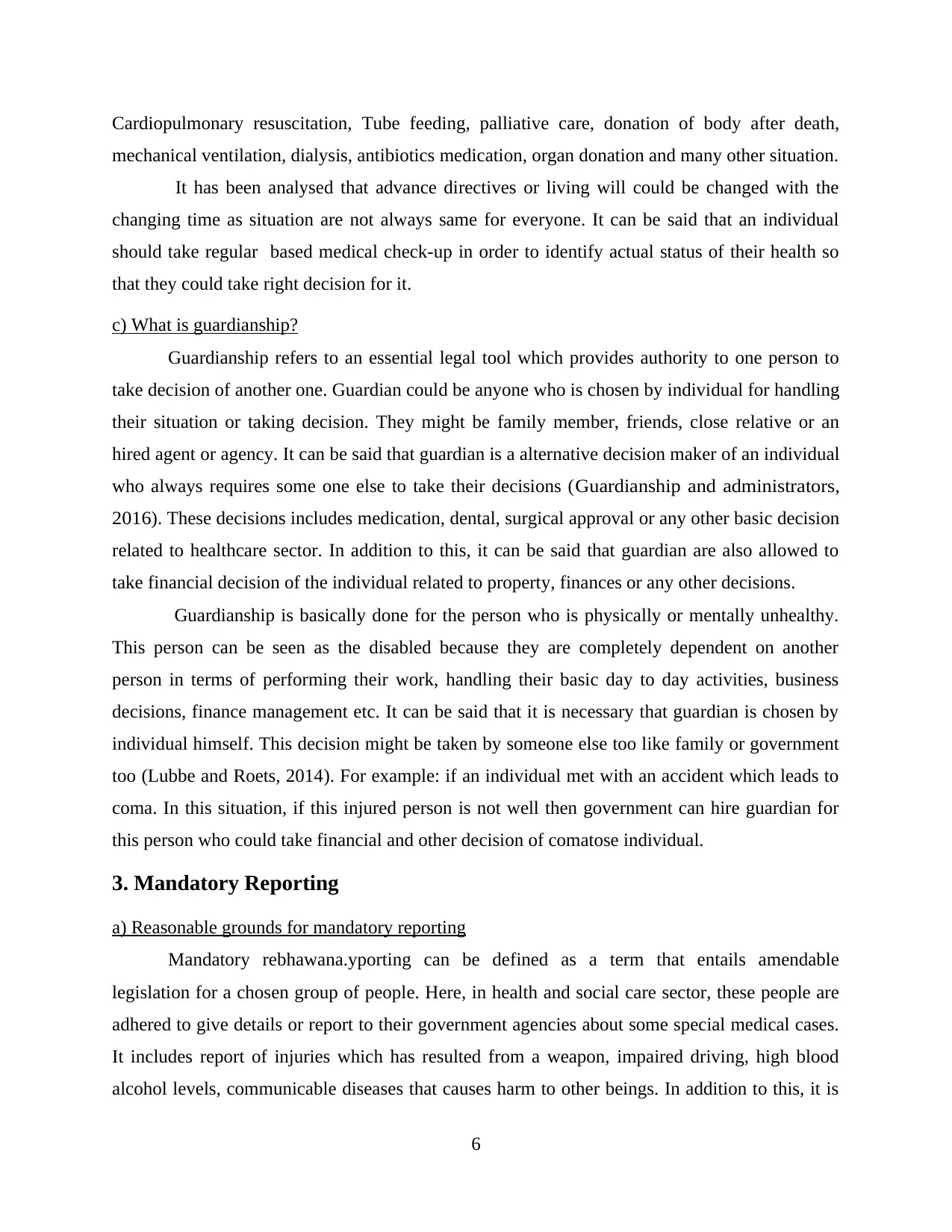
Cardiopulmonary resuscitation, Tube feeding, palliative care, donation of body after death,
mechanical ventilation, dialysis, antibiotics medication, organ donation and many other situation.
It has been analysed that advance directives or living will could be changed with the
changing time as situation are not always same for everyone. It can be said that an individual
should take regular based medical check-up in order to identify actual status of their health so
that they could take right decision for it.
c) What is guardianship?
Guardianship refers to an essential legal tool which provides authority to one person to
take decision of another one. Guardian could be anyone who is chosen by individual for handling
their situation or taking decision. They might be family member, friends, close relative or an
hired agent or agency. It can be said that guardian is a alternative decision maker of an individual
who always requires some one else to take their decisions ( Guardianship and administrators,
2016). These decisions includes medication, dental, surgical approval or any other basic decision
related to healthcare sector. In addition to this, it can be said that guardian are also allowed to
take financial decision of the individual related to property, finances or any other decisions.
Guardianship is basically done for the person who is physically or mentally unhealthy.
This person can be seen as the disabled because they are completely dependent on another
person in terms of performing their work, handling their basic day to day activities, business
decisions, finance management etc. It can be said that it is necessary that guardian is chosen by
individual himself. This decision might be taken by someone else too like family or government
too (Lubbe and Roets, 2014). For example: if an individual met with an accident which leads to
coma. In this situation, if this injured person is not well then government can hire guardian for
this person who could take financial and other decision of comatose individual.
3. Mandatory Reporting
a) Reasonable grounds for mandatory reporting
Mandatory rebhawana.yporting can be defined as a term that entails amendable
legislation for a chosen group of people. Here, in health and social care sector, these people are
adhered to give details or report to their government agencies about some special medical cases.
It includes report of injuries which has resulted from a weapon, impaired driving, high blood
alcohol levels, communicable diseases that causes harm to other beings. In addition to this, it is
6
mechanical ventilation, dialysis, antibiotics medication, organ donation and many other situation.
It has been analysed that advance directives or living will could be changed with the
changing time as situation are not always same for everyone. It can be said that an individual
should take regular based medical check-up in order to identify actual status of their health so
that they could take right decision for it.
c) What is guardianship?
Guardianship refers to an essential legal tool which provides authority to one person to
take decision of another one. Guardian could be anyone who is chosen by individual for handling
their situation or taking decision. They might be family member, friends, close relative or an
hired agent or agency. It can be said that guardian is a alternative decision maker of an individual
who always requires some one else to take their decisions ( Guardianship and administrators,
2016). These decisions includes medication, dental, surgical approval or any other basic decision
related to healthcare sector. In addition to this, it can be said that guardian are also allowed to
take financial decision of the individual related to property, finances or any other decisions.
Guardianship is basically done for the person who is physically or mentally unhealthy.
This person can be seen as the disabled because they are completely dependent on another
person in terms of performing their work, handling their basic day to day activities, business
decisions, finance management etc. It can be said that it is necessary that guardian is chosen by
individual himself. This decision might be taken by someone else too like family or government
too (Lubbe and Roets, 2014). For example: if an individual met with an accident which leads to
coma. In this situation, if this injured person is not well then government can hire guardian for
this person who could take financial and other decision of comatose individual.
3. Mandatory Reporting
a) Reasonable grounds for mandatory reporting
Mandatory rebhawana.yporting can be defined as a term that entails amendable
legislation for a chosen group of people. Here, in health and social care sector, these people are
adhered to give details or report to their government agencies about some special medical cases.
It includes report of injuries which has resulted from a weapon, impaired driving, high blood
alcohol levels, communicable diseases that causes harm to other beings. In addition to this, it is
6
⊘ This is a preview!⊘
Do you want full access?
Subscribe today to unlock all pages.

Trusted by 1+ million students worldwide
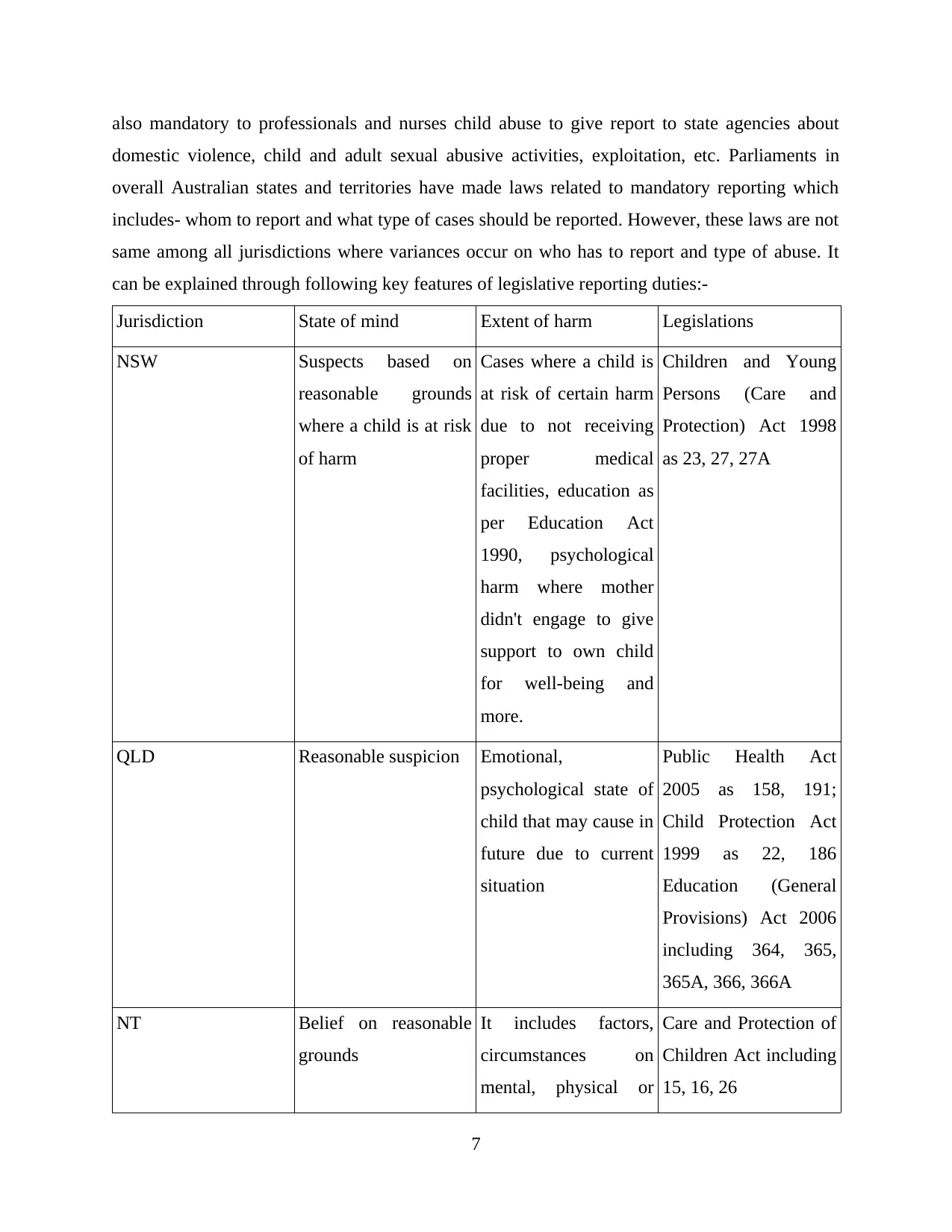
also mandatory to professionals and nurses child abuse to give report to state agencies about
domestic violence, child and adult sexual abusive activities, exploitation, etc. Parliaments in
overall Australian states and territories have made laws related to mandatory reporting which
includes- whom to report and what type of cases should be reported. However, these laws are not
same among all jurisdictions where variances occur on who has to report and type of abuse. It
can be explained through following key features of legislative reporting duties:-
Jurisdiction State of mind Extent of harm Legislations
NSW Suspects based on
reasonable grounds
where a child is at risk
of harm
Cases where a child is
at risk of certain harm
due to not receiving
proper medical
facilities, education as
per Education Act
1990, psychological
harm where mother
didn't engage to give
support to own child
for well-being and
more.
Children and Young
Persons (Care and
Protection) Act 1998
as 23, 27, 27A
QLD Reasonable suspicion Emotional,
psychological state of
child that may cause in
future due to current
situation
Public Health Act
2005 as 158, 191;
Child Protection Act
1999 as 22, 186
Education (General
Provisions) Act 2006
including 364, 365,
365A, 366, 366A
NT Belief on reasonable
grounds
It includes factors,
circumstances on
mental, physical or
Care and Protection of
Children Act including
15, 16, 26
7
domestic violence, child and adult sexual abusive activities, exploitation, etc. Parliaments in
overall Australian states and territories have made laws related to mandatory reporting which
includes- whom to report and what type of cases should be reported. However, these laws are not
same among all jurisdictions where variances occur on who has to report and type of abuse. It
can be explained through following key features of legislative reporting duties:-
Jurisdiction State of mind Extent of harm Legislations
NSW Suspects based on
reasonable grounds
where a child is at risk
of harm
Cases where a child is
at risk of certain harm
due to not receiving
proper medical
facilities, education as
per Education Act
1990, psychological
harm where mother
didn't engage to give
support to own child
for well-being and
more.
Children and Young
Persons (Care and
Protection) Act 1998
as 23, 27, 27A
QLD Reasonable suspicion Emotional,
psychological state of
child that may cause in
future due to current
situation
Public Health Act
2005 as 158, 191;
Child Protection Act
1999 as 22, 186
Education (General
Provisions) Act 2006
including 364, 365,
365A, 366, 366A
NT Belief on reasonable
grounds
It includes factors,
circumstances on
mental, physical or
Care and Protection of
Children Act including
15, 16, 26
7
Paraphrase This Document
Need a fresh take? Get an instant paraphrase of this document with our AI Paraphraser
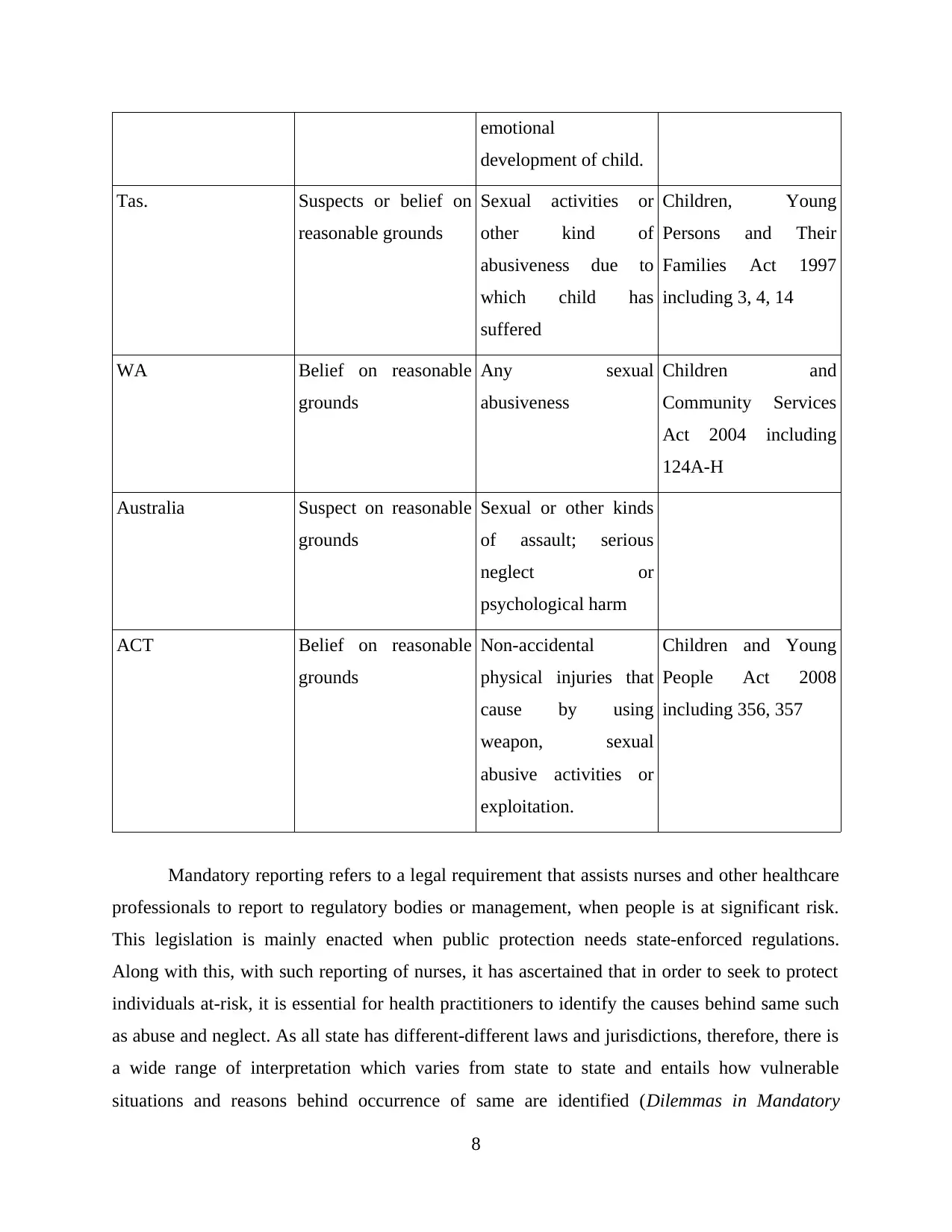
emotional
development of child.
Tas. Suspects or belief on
reasonable grounds
Sexual activities or
other kind of
abusiveness due to
which child has
suffered
Children, Young
Persons and Their
Families Act 1997
including 3, 4, 14
WA Belief on reasonable
grounds
Any sexual
abusiveness
Children and
Community Services
Act 2004 including
124A-H
Australia Suspect on reasonable
grounds
Sexual or other kinds
of assault; serious
neglect or
psychological harm
ACT Belief on reasonable
grounds
Non-accidental
physical injuries that
cause by using
weapon, sexual
abusive activities or
exploitation.
Children and Young
People Act 2008
including 356, 357
Mandatory reporting refers to a legal requirement that assists nurses and other healthcare
professionals to report to regulatory bodies or management, when people is at significant risk.
This legislation is mainly enacted when public protection needs state-enforced regulations.
Along with this, with such reporting of nurses, it has ascertained that in order to seek to protect
individuals at-risk, it is essential for health practitioners to identify the causes behind same such
as abuse and neglect. As all state has different-different laws and jurisdictions, therefore, there is
a wide range of interpretation which varies from state to state and entails how vulnerable
situations and reasons behind occurrence of same are identified (Dilemmas in Mandatory
8
development of child.
Tas. Suspects or belief on
reasonable grounds
Sexual activities or
other kind of
abusiveness due to
which child has
suffered
Children, Young
Persons and Their
Families Act 1997
including 3, 4, 14
WA Belief on reasonable
grounds
Any sexual
abusiveness
Children and
Community Services
Act 2004 including
124A-H
Australia Suspect on reasonable
grounds
Sexual or other kinds
of assault; serious
neglect or
psychological harm
ACT Belief on reasonable
grounds
Non-accidental
physical injuries that
cause by using
weapon, sexual
abusive activities or
exploitation.
Children and Young
People Act 2008
including 356, 357
Mandatory reporting refers to a legal requirement that assists nurses and other healthcare
professionals to report to regulatory bodies or management, when people is at significant risk.
This legislation is mainly enacted when public protection needs state-enforced regulations.
Along with this, with such reporting of nurses, it has ascertained that in order to seek to protect
individuals at-risk, it is essential for health practitioners to identify the causes behind same such
as abuse and neglect. As all state has different-different laws and jurisdictions, therefore, there is
a wide range of interpretation which varies from state to state and entails how vulnerable
situations and reasons behind occurrence of same are identified (Dilemmas in Mandatory
8
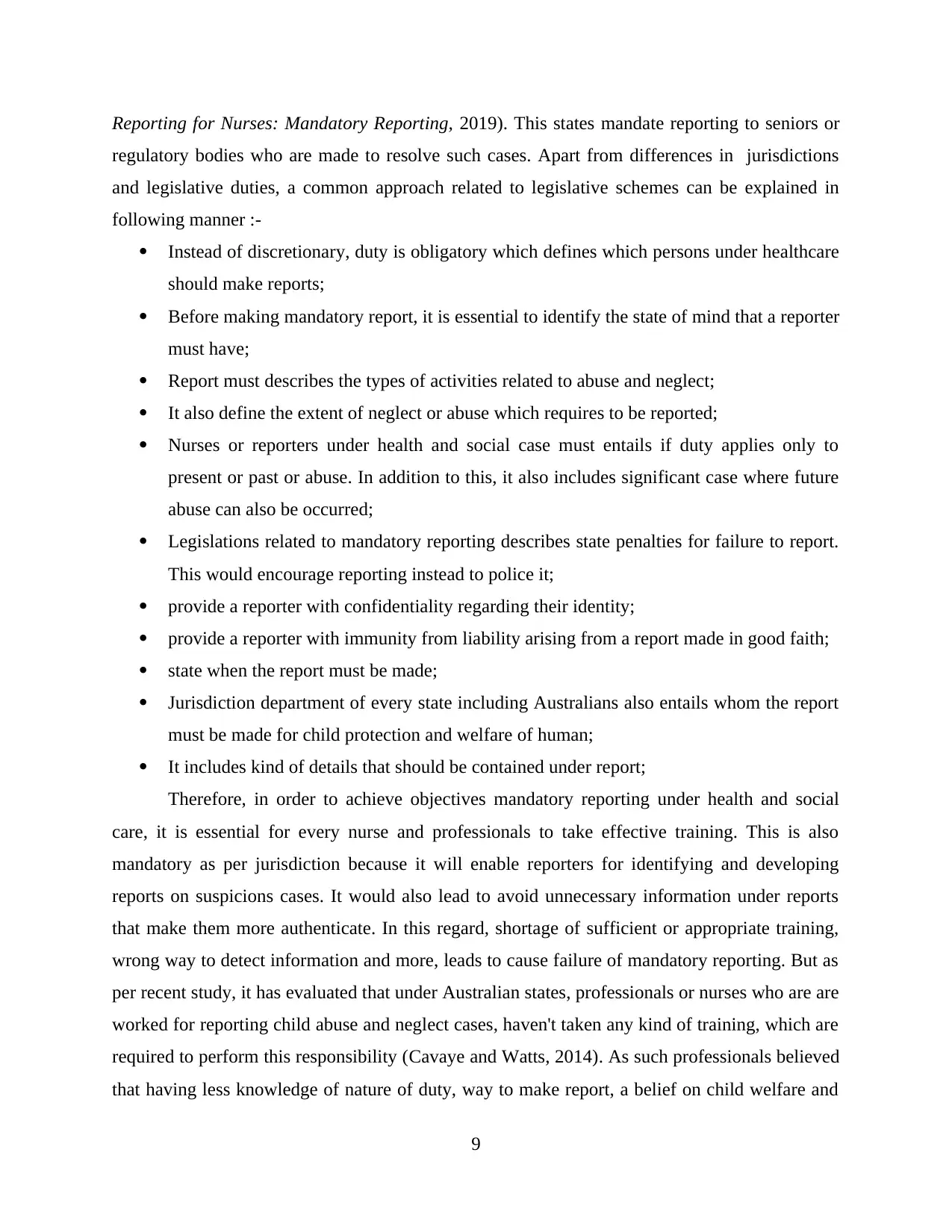
Reporting for Nurses: Mandatory Reporting, 2019). This states mandate reporting to seniors or
regulatory bodies who are made to resolve such cases. Apart from differences in jurisdictions
and legislative duties, a common approach related to legislative schemes can be explained in
following manner :-
Instead of discretionary, duty is obligatory which defines which persons under healthcare
should make reports;
Before making mandatory report, it is essential to identify the state of mind that a reporter
must have;
Report must describes the types of activities related to abuse and neglect;
It also define the extent of neglect or abuse which requires to be reported;
Nurses or reporters under health and social case must entails if duty applies only to
present or past or abuse. In addition to this, it also includes significant case where future
abuse can also be occurred;
Legislations related to mandatory reporting describes state penalties for failure to report.
This would encourage reporting instead to police it;
provide a reporter with confidentiality regarding their identity;
provide a reporter with immunity from liability arising from a report made in good faith;
state when the report must be made;
Jurisdiction department of every state including Australians also entails whom the report
must be made for child protection and welfare of human;
It includes kind of details that should be contained under report;
Therefore, in order to achieve objectives mandatory reporting under health and social
care, it is essential for every nurse and professionals to take effective training. This is also
mandatory as per jurisdiction because it will enable reporters for identifying and developing
reports on suspicions cases. It would also lead to avoid unnecessary information under reports
that make them more authenticate. In this regard, shortage of sufficient or appropriate training,
wrong way to detect information and more, leads to cause failure of mandatory reporting. But as
per recent study, it has evaluated that under Australian states, professionals or nurses who are are
worked for reporting child abuse and neglect cases, haven't taken any kind of training, which are
required to perform this responsibility (Cavaye and Watts, 2014). As such professionals believed
that having less knowledge of nature of duty, way to make report, a belief on child welfare and
9
regulatory bodies who are made to resolve such cases. Apart from differences in jurisdictions
and legislative duties, a common approach related to legislative schemes can be explained in
following manner :-
Instead of discretionary, duty is obligatory which defines which persons under healthcare
should make reports;
Before making mandatory report, it is essential to identify the state of mind that a reporter
must have;
Report must describes the types of activities related to abuse and neglect;
It also define the extent of neglect or abuse which requires to be reported;
Nurses or reporters under health and social case must entails if duty applies only to
present or past or abuse. In addition to this, it also includes significant case where future
abuse can also be occurred;
Legislations related to mandatory reporting describes state penalties for failure to report.
This would encourage reporting instead to police it;
provide a reporter with confidentiality regarding their identity;
provide a reporter with immunity from liability arising from a report made in good faith;
state when the report must be made;
Jurisdiction department of every state including Australians also entails whom the report
must be made for child protection and welfare of human;
It includes kind of details that should be contained under report;
Therefore, in order to achieve objectives mandatory reporting under health and social
care, it is essential for every nurse and professionals to take effective training. This is also
mandatory as per jurisdiction because it will enable reporters for identifying and developing
reports on suspicions cases. It would also lead to avoid unnecessary information under reports
that make them more authenticate. In this regard, shortage of sufficient or appropriate training,
wrong way to detect information and more, leads to cause failure of mandatory reporting. But as
per recent study, it has evaluated that under Australian states, professionals or nurses who are are
worked for reporting child abuse and neglect cases, haven't taken any kind of training, which are
required to perform this responsibility (Cavaye and Watts, 2014). As such professionals believed
that having less knowledge of nature of duty, way to make report, a belief on child welfare and
9
⊘ This is a preview!⊘
Do you want full access?
Subscribe today to unlock all pages.

Trusted by 1+ million students worldwide
1 out of 25
Related Documents
Your All-in-One AI-Powered Toolkit for Academic Success.
+13062052269
info@desklib.com
Available 24*7 on WhatsApp / Email
![[object Object]](/_next/static/media/star-bottom.7253800d.svg)
Unlock your academic potential
Copyright © 2020–2026 A2Z Services. All Rights Reserved. Developed and managed by ZUCOL.





